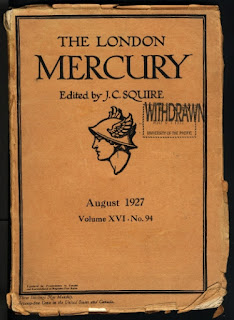 |
| Has Cathcart become withdrawn?!? |
A blog brought to you by the Huntington Public Library Adult Reference and Services Department... bringing books and readers together since 1875.
Friday, June 22, 2018
"The Man Who Loved Islands," by D.H. Lawrence
Tuesday, June 5, 2018
"Philosophy and Knowledge," by Bertrand Russell
 |
| Lord Russell |
Russell has given us an excellent example to test his theories on knowledge. It would be hard enough to state definitively one's own feelings of love, let alone those of another. Russell writes:
We may say that a truth is self-evident, in the first and most absolute sense, when we have acquaintance with the fact which corresponds to the truth. When Othello believes that Desdemona loves Cassio, the corresponding fact, if his belief were true, would be "Desdemona's love for Cassio."
This would be a fact with which no one could have acquaintance except Desdemona; hence in the sense of self-evidence that we are considering, the truth that Desdemona loves Cassio (if it were a truth) could only be self-evident to Desdemona.
How very different is Russell's conception of self-evident truth from that of our Thomas Jefferson (all men being created equal, endowed by their Creator with certain inalienable rights, among which are Life, Liberty and the Pursuit of Happiness ...)
Russell goes on "...no fact about any particular existing thing can be self-evident to more than one person. On the other hand, facts about universals do not have this privacy. Many minds may be acquainted with the same universals; hence a relation between universals may be known by acquaintance to many different people."
He had previously stated that what he terms "knowledge by acquaintance" can only exist when there really is "such a fact." Russell would deem the Declaration's assertion of these self-evident truths to fall short of the standard he sets.
Whether Russell would consider the Jeffersonian truths "universal" was beyond the scope of our discussion, as his definition of universal truths is put forth in an earlier chapter of The Problems of Philosophy.
Russell's book stands as a rigorous exploration of categories of knowledge. He uses the English language with great precision to delineate these categories. Therein lies the ultimate value of the piece.
The group is to be congratulated for tackling works by three major philosophers (Mill, Santayana, and Russell) in three consecutive months.
*Incidentally, when Huntington Public Library's Carolyn Hasler and I started the book group in January 2005, The Tragedy of Othello was the group's inaugural selection!
Subscribe to:
Comments (Atom)